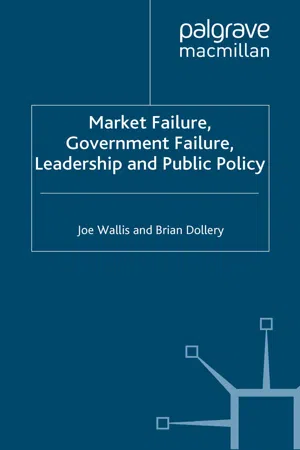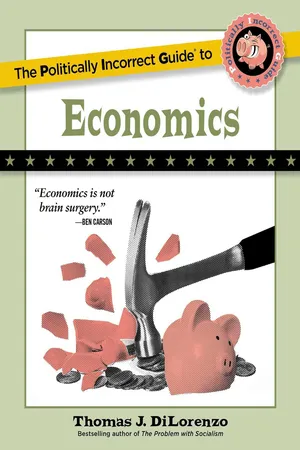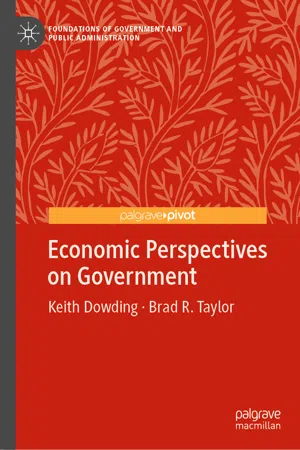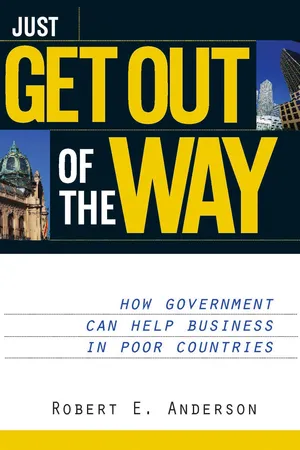Economics
Government Failure
Government failure refers to situations where government intervention in the economy results in outcomes that are less efficient than if the government had not intervened at all. This can occur due to factors such as bureaucratic inefficiency, lack of information, or political motivations. Government failure can lead to unintended consequences and inefficiencies in resource allocation.
Written by Perlego with AI-assistance
Related key terms
1 of 5
11 Key excerpts on "Government Failure"
- eBook - PDF
A Critical Account of Article 106(2) TFEU
Government Failure in Public Service Provision
- Jarleth Burke(Author)
- 2018(Publication Date)
- Hart Publishing(Publisher)
The limits of intervention in markets can be understood by reference to the concept of Government Failure. In very general terms, Government Failure is concerned with how government interventions in any sphere of its activities are ineffectual or suboptimal. 1 In the economic sphere, it may result in avoidable inefficiencies, often arising from the exclusion or restriction of competition. Separately, excess resources may be consumed in the realisation of the underlying objective. Very frequently those imperfections undermine the efficacy or scope of the underlying objective, which in many cases may be distributional. In that 22 The Pathology of Government Failure 2 See generally, Ledyard, J, ‘Market Failure’ in Durlauf and Blume (eds), The New Palgrave Dictionary of Economics (online edition, 2008). 3 As to the claim that Government Failure is a part analogue to market failure, see Dollery, B and Worthington, A, ‘The Evaluation of Public Policy: Normative Economic Theories of Government Failure’ (1996) 7(1) Journal of Interdisciplinary Economics 27–39. regard, and as I will demonstrate, Government Failure scholarship with a focus on microeconomic issues ranges more widely than an assessment of government efforts to resolve classic market failures. That is important considering the range of general interests capable of being accommodated under Article 106(2), which in many cases encompass the pursuit of distributional or cohesion goals. Considering the function of Article 106(2), the fundamental question that arises concerns how well it performs that role, or more precisely, how effectively is it deployed to that end. It is something of a paradox that such a scientific questioning of the operation of Article 106(2) has not taken place. - eBook - PDF
- Wyn Grant(Author)
- 2017(Publication Date)
- Red Globe Press(Publisher)
In order to assess these concerns, it is necessary to consider in more depth the issues of market failure and Government Failure. Market failure Market failure is perhaps an unduly dramatic term as it suggests some type of catastrophic collapse. In fact reference is being made to a sub-optimal outcome that may be capable of remedy. In general what is being talked about is a situation in which a competitive market made up of agents pursuing their self-interest leads to an outcome that is judged socially inefficient. In particular, this refers 68 Economic Policy in Britain to allocative inefficiency. This covers both what is known as X-inefficiency which might be regarded as what we conventionally regard as efficiency (the production of a good or service using the minimum of inputs), but also 'whether the commodity concerned meets the wants of its consumers as effectively as possible' (Le Grand, 1991, p. 425). The problem of market failure can be analysed in terms of the assumptions and language of economics or a broader moral and social critique. First we shall discuss five common market failures discussed in the economics literature. This is not an exhaustive list, but it covers the most important cases. First, there is a monopoly and the conse-quent absence of competition. Market domination allows the mon-opolist to set a monopoly price to the disadvantage of consumers. The policy response to this has been to develop a competition policy that seeks to break up monopolies or prevent their formation. Such policies have enjoyed variable success (see Chapter 6). A special subset of monopoly is the natural monopoly where it is claimed that the most efficient outcome is secured by having only one producer. This was the classic justification of public-utility national-ization where it was argued that duplicating transmission systems was manifestly inefficient. - B. Dollery, J. Wallis(Authors)
- 1999(Publication Date)
- Palgrave Macmillan(Publisher)
The market failure para- digm for microeconomic policymaking assumes governments intervene in the public interest to restore economic efficiency. The market failure para- digm is thus a normative theory of government intervention insofar as it prescribes how governments 'should' behave. As we shall see, the market failure paradigm can be extended to include distributional or equity ele- ments, and its policy implications can be modified in the light of a positive theory of government intervention, namely public choice theory. Sources of Market Failure Economists have identified numerous sources of market failure and indeed instances of real or perceived market failure are probably limited only by Market Failure and Government Intervention 17 the imaginations of the economic theorists. However, text books typically emphasize six main forms of market failure which we will discuss below. Firstly, for Adam Smith's invisible hand to operate properly markets must be competitive rather than monopolistic or oligopolistic. Various reasons exist for the absence of competition in some defined market. Geographic factors such as large distances or isolated locations can mean limited competition. For example, the vast outback of Australia contains numerous small communities often serviced by a single retail supplier. Similarly, limited ownership of some natural resource can confer mono- poly power on a producer. Governments may often create monopolies through the legal system. For instance, patent laws grant monopoly rights to inventors for specified time periods. Similarly, gaming operators are usually given exclusive control over casinos in particular jurisdictions. However, perhaps the most significant in the present context are barriers to entry into an industry which arise from increasing returns to scale. This necessarily implied decreasing average costs over large volumes of output and the potential for natural monopolies to arise.- eBook - ePub
Economic Principles and Problems - A Pluralist Introduction
Special Sale for Roskilde University Basic Course in Socio-Economics
- Geoffrey Schneider(Author)
- 2023(Publication Date)
- Routledge(Publisher)
Soft budget constraints occur when industries expect to be continuously bailed out and therefore have no incentive to become efficient or to avoid excessive risk. Example: Many economists worry that the bailout of large banks after the financial crisis of 2008 will result in banks expecting to be bailed out whenever a crisis hits, no matter how irresponsibly they behaved. Previous bailouts have encouraged banks to continue to engage in a larger proportion of risky investments than would otherwise be the case.Government Failure can be addressed in three ways. Laissez-faire advocates use Government Failure to argue for less government intervention, arguing that in most cases it is not possible for the government to be as efficient as the unregulated market. Keynesian economists advocate improving government intervention to reduce Government Failure, arguing that where market failures are pervasive and problematic government intervention is preferable to the consequences of market failure. Political economists tend to see government intervention as primarily reflecting the interests of the dominant classes, and they argue for a more extensive control of the government and the economy by democratic means.Eliminating or reducing Government Failure usually requires greater investment in salaries and resources for regulatory bodies, which in turn requires more tax revenue. Societies must therefore choose between investing more in government to better control market failures or living with the consequences of market failure and Government Failure.19.10 CONCLUSION
As with so many issues, economists disagree on how to approach the issues of market failures and Government Failures. From a pro-corporate perspective espoused by conservative Austrian and mainstream economists - eBook - PDF
- Kumar, A(Authors)
- 2021(Publication Date)
- Daya Publishing House(Publisher)
Otherwise society faces a crisis of market failure. While market failure provides a basis for government intervention, such intervention has its own costs. The benefits of government intervention must be weighed against the costs of that intervention. Government Failure Implicitly government has been assumed so far to be capable of correcting market failure. However, government involvement may make a market failure worse rather than better. Furthermore, the government may set up rules which lead to market failure. Finally government itself requires resources which can place a heavy drain on an economy. In this section we’ll examine these Government Failures from the point of view of a former CEO of the Dupont Corporation, named Irving Shapiro. Externalities and Side Effects Government policies can have their own externalities and side effects which may not always be desirable. When the Soviet Union fell apart in the early 1990s it became apparent that the Soviet government had permitted massive pollution and destruction of its territories. The American government itself has been a major polluter. Oversight of the government by the government itself produces an obvious conflict of interest. Economic Distortions Government policy can also lead to inefficiencies. The government has been very slow to realize the sophisticated workings of markets. By imposing rules, a government agency can create surpluses or shortages. Either type of This ebook is exclusively for this university only. Cannot be resold/distributed. market disequilibrium results in waste. Once again it is instructive to look at the example of the Soviet Union before it fell. As American director of the U.S.–U.S.S.R. Trade and Economic Council, Inc., Du Pont’s Shapiro had become acquainted with a classic example of the inefficiencies of government: It’s much worse in Russia, because the only structure in their society is government. - eBook - ePub
Understanding Business: Markets
A Multidimensional Approach to the Market Economy
- Vivek Suneja(Author)
- 2005(Publication Date)
- Routledge(Publisher)
SECTION 4: MARKET FAILURE INTRODUCTION Markets are not infallible: they can fail to organise economic activity in a socially desirable fashion. Chapter 7, When markets fail by Sloman and Sutcliffe explores the various sources and dimensions of market failure. Markets may fail to generate socially efficient outcomes and may fail to deliver equitable outcomes. Various factors may lead to social inefficiencies, these include: externalities; public goods; the behaviour of monopolies and oligopolies; ‘inappropriate’ consumer preferences; lack of information; uncertainty; and the immobility of factors of production. Inequitable outcomes may be generated by an inequitable initial distribution of resources, unequal access to career advancing opportunities or an unequal distribution of bargaining power. Sloman and Sutcliffe investigate whether and how some of these market failures can be remedied, and what role the government can play in this process. The state may potentially use a wide array of instruments to correct market failure, such as the use of taxes and subsidies, provision of missing information, the creation or alteration of property rights, the establishment of laws and bodies to regulate economic behaviour and the direct provision of certain goods and services. State intervention is not without its problems though. Just as markets can fail, so can governments. ‘Government Failure’ may be caused by a range of factors, such as the costs involved in gathering the required information, the inefficiency that may result due to lack of market incentives and the absence of adequate accountability. In recent years, many countries have reduced the degree of state intervention in their economies as a consequence of such considerations. They have also experimented with newer forms of state intervention, such as trying to regulate the production of certain goods and services rather than providing them directly through public enterprises - eBook - ePub
- Thomas J. DiLorenzo(Author)
- 2022(Publication Date)
- Regnery(Publisher)
The Economics of Government FailureF or most of the twentieth century, the economics profession was obsessed with the nirvana fallacy and invented innumerous theories of “market failure.” The analysis was always accompanied by recommendations for taxation, regulation, government subsidies, government mandates, price controls, or other forms of government interventionism and central planning to fix supposed market failure problems. It was simply assumed that government bureaucrats, instructed and funded by the not-so-invisible-hands of politicians, would be, well, perfect. Perfect politicians and bureaucrats would fix the problems created by imperfect markets—in other words, the behavior of people like yourself and your author.Beginning in the late 1950s and 1960s a group of economists, many associated with the University of Chicago, began to revive the limited-constitutional-government thinking of the American founders as it applied to economic analysis. They invented a whole new subdiscipline called “public choice” which was essentially the application of economic theory and methodology to the study of political decision-making.1 The topics they researched and wrote about were traditional political science topics—elections, lobbying, special-interest groups, bureaucracy, and so forth—but the methodology was from the field of economics.A man who leaves the business world and is elected to public office does not sprout an angel’s halo and become a virtual Mother Teresa; nor does he grow devil’s horns and necessarily become corrupt or incompetent. Like everyone else, politicians want to keep their jobs, get promoted to higher offices, and generally prosper. This motivation guides their behavior, says public choice analysis. The result is that while government may do many things that benefit the general public (maintaining law and order, defending against foreign invaders, enforcing the rule of law, and the like), there are also many reasons that Government Failure - C. Peláez(Author)
- 2015(Publication Date)
- Palgrave Macmillan(Publisher)
Government-owned banks are more 12 Financial Regulation after the Global Recession likely to provide loans to socially unrewarding projects of vested inter- ests that have political connections and power passing on the burden to the general public in the form of taxes, higher product prices, and an inefficient economy. The estimate of the cost of inefficiencies caused by the government in intervention to ameliorate market failures is in the hundreds of billions of dollars. 13 In cases of actual existence of market failures, there were successes at the expense of diminishing significant ben- efits and there were reductions of welfare or economic well-being in various instances. Government Failures occur because policies are erroneous or ineffectively implemented, being subject to influence by interest groups against the general social interest. There are cases when there is evidence favoring government measures, but politics and ineffectiveness of the relevant agencies prevent sound policy and implementation. Transactions costs and property rights Neoclassical or mainstream economics and the theory and policy of market failures ignored the existence of transaction costs. This is not uncommon when developing theories from abstract assumptions; a change in assumptions leads to a different proposition. The fact is that transaction costs are significantly large and cannot be ignored in the analysis of the firm and in their relation to property rights. An important turning point in the debate is that the conventional approach to externalities identifies a perpetrator and a victim and takes actions to make the perpetrator compensate the victim. 14 This approach is wrong because of the essentially reciprocal nature of externalities. The principle should be preventing the most serious harm. The first case considered is that of the pricing or market system work- ing effectively with liability for damage and without costs.- eBook - PDF
- William Spangar Peirce, Peter H. Rossi(Authors)
- 2013(Publication Date)
- Academic Press(Publisher)
2 7 2 20. FAILURE AND THE ROLE OF GOVERNMENT perfect competition are not met one can imagine a more efficient alloca-tion of resources than that provided by the market. Since the first task has been so well done for such a long time, it is not surprising that the efforts of theorists have been devoted primarily to analyzing the imper-fections. The past decade has seen increasing concern with another task; that is, devising institutional arrangements that would actually move the economy closer to the perfect efficiency that one can imagine. Most of the theoretical work has been limited to rather abstract remarks about using taxes and subsidies to correct market prices, however. What is required now is some form of cost-benefit analysis of gov-ernment intervention. In the absence of a well-developed understand-ing of government behavior, however, it is not possible to carry out that cost-benefit analysis in advance of trying the intervention. Since the failed experiments of government are rarely discontinued, studies of failure are of little use unless they include generalizations for con-templated programs. Such generalizations are, implicitly or explicitly, based on a theory of government behavior, which is not available in a widely accepted form. Policy analysis, thus, provides us with (a) studies of particular cases, {b) controversial attempts to predict the results of future programs on the basis of partially relevant experience, and (c) a series of assertions, fairly plausible at the extremes but becoming in-tensely controversial in the middle range, about the appropriate functions and interventions of government. For example, the exter-nalities inflicted by m y choice of a necktie are too trivial to become a concern of government, whereas the quantity and quality of effluent that your plant dumps in the river are matters of legitimate public con-cern. - eBook - ePub
- Keith Dowding, Brad R. Taylor(Authors)
- 2019(Publication Date)
- Palgrave Pivot(Publisher)
© The Author(s) 2020Begin AbstractEconomic Perspectives on Government Foundations of Government and Public Administration https://doi.org/10.1007/978-3-030-19707-0_2Keith Dowding andBrad R. Taylor2. Markets, Market Failure and the Role of Government
Keith Dowding1andBrad R. Taylor2(1) School of Politics and International Relations, Australian National University, Canberra, ACT, Australia(2) School of Commerce, University of Southern Queensland, Springfield, QLD, AustraliaAbstract
This chapter introduces Pareto efficiency as the key normative concept of welfare economics and describes the conditions under which we expect efficiency or market failure. We pay particular attention to the existence of externalities and show how these can, but do not always, cause markets to fail. Whenever there is market failure it is conceptually possible for government to intervene in order to improve outcomes. Government Failure also occurs, however, and so such intervention is not always practical. When considering imperfect alternatives, we must engage in comparative institutional analysis.End AbstractKeywords
Pareto efficiency Market competition Market failure Externalities Government Failure Coase theorem Monopoly Asymmetric informationThe Invisible Hand and Market Efficiency
A good deal of economic theory is positive—it attempts to explain and predict economic and social outcomes based on the rational choice assumptions outlined in the previous chapter. Economics also has a normative purpose, however, and economists have developed the concept of efficiency as a tool to consider the desirability of markets and to compare alternative policy options.In this chapter, we outline the assumptions and methods of welfare economics - eBook - ePub
Just Get Out of the Way
How Government Can Help Business in Poor Countries
- Robert E. Anderson(Author)
- 2004(Publication Date)
- Cato Institute(Publisher)
1. Government Failure versus Market Failure
This book is based on two beliefs. First, economic growth is essential for reducing poverty in third world or developing countries. Second, an efficient, dynamic, and growing private sector is the only way to increase the rate of economic growth. This book then takes the next step and asks what governments can do to help develop the private sector.The main conclusion is that the government often does too much. Many government programs and policies designed to help the private sector actually impede its development. The major reasons are the low level of ability or competence in most government institutions, the high level of corruption, and the influence of special-interest groups. Though private markets often fail to provide perfect outcomes, the ability of the government in poor countries to fix these failures is limited.This conclusion reminds me of what my exasperated father told me many years ago when I was attempting to help him carry out a home improvement project: ‘‘Son, if you can’t help, at least get out of the way.’’ The best that governments can do in many poor countries is just get out of the way. The following chapters analyze which government policies intended to help the private sector are likely to succeed and how they can be designed to compensate for the government’s poor ability to implement them.Government Corruption and Incompetence
I first became concerned about government corruption and incompetence in 1991 when I went to work for the agency that managed privatization in Russia (the State Property Committee). Previously, I had worked on the privatization program in New Zealand managed by the Treasury. Though I was a U.S. citizen, the New Zealand Treasury recruited me along with a number of other foreign citizens to be regular members of the New Zealand civil service. The Treasury felt it needed additional expertise to help with the Labour government’s ambitious economic reform program under the leadership of the minister of finance, Roger Douglas.
Index pages curate the most relevant extracts from our library of academic textbooks. They’ve been created using an in-house natural language model (NLM), each adding context and meaning to key research topics.










